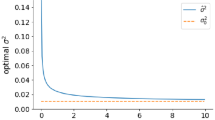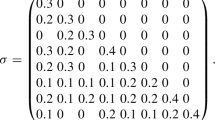Abstract
We study a continuous-time expected utility maximisation problem where the investor at maturity receives the value of a contingent claim in addition to the investment payoff from the financial market. The investor knows nothing about the claim other than its probability distribution; hence the name “intractable claim”. In view of the lack of necessary information about the claim, we consider a robust formulation to maximise her utility in the worst scenario. We apply the quantile formulation to solve the problem, express the quantile function of the optimal terminal investment income as the solution of certain variational inequalities of ordinary differential equations, and obtain the resulting optimal trading strategy. In the case of exponential utility, the problem reduces to a (non-robust) rank-dependent utility maximisation with probability distortion whose solution is available in the literature. The results can also be used to determine the utility indifference price of the intractable claim.
Similar content being viewed by others
References
Cvitanić, J., Schachermayer, W., Wang, H.: Utility maximisation in incomplete markets with random endowment. Finance Stoch. 5, 259–272 (2001)
Davis, M.H.A.: Option pricing in incomplete markets. In: Dempster, M.A.H., Pliska, S.R. (eds.) Mathematics of Derivative Securities, pp. 216–227. Cambridge University Press, Cambridge (1997)
He, X.D., Jin, H.Q., Zhou, X.Y.: Dynamic portfolio choice when risk is measured by weighted VaR. Math. Oper. Res. 40, 773–796 (2015)
He, X.D., Zhou, X.Y.: Portfolio choice via quantiles. Math. Finance 21, 203–231 (2011)
Hou, D., Xu, Z.Q.: A robust Markowitz mean–variance portfolio selection model with an intractable claim. SIAM J. Financ. Math. 7, 124–151 (2016)
Hugonnier, J., Kramkov, D., Schachermayer, W.: On utility based pricing of contingent claims in incomplete markets. Math. Finance 15, 203–212 (2005)
Jin, H.Q., Xu, Z.Q., Zhou, X.Y.: A convex stochastic optimization problem arising from portfolio selection. Math. Finance 18, 171–184 (2008)
Jin, H.Q., Zhou, X.Y.: Behavioral portfolio selection in continuous time. Math. Finance 18, 385–426 (2008)
Kahneman, D., Tversky, A.: Prospect theory: an analysis of decision under risk. Econometrica 46, 171–185 (1979)
Karatzas, I., Shreve, S.E.: Methods of Mathematical Finance. Springer, New York (1998)
Musiela, M., Zariphopoulou, T.: An example of indifference prices under exponential preferences. Finance Stoch. 8, 229–239 (2004)
Musiela, M., Zariphopoulou, T.: A valuation algorithm for indifference prices in incomplete markets. Finance Stoch. 8, 399–414 (2004)
Müller, A.: Stop-loss order for portfolios of dependent risks. Insur. Math. Econ. 21, 219–223 (1997)
Oberman, A., Zariphopoulou, T.: Pricing early exercise contracts in incomplete markets. Comput. Manag. Sci. 1, 75–107 (2003)
Porchet, A., Touzi, N., Warin, X.: Valuation of power plants by utility indifference and numerical computation. Math. Methods Oper. Res. 70, 47–75 (2009)
Quiggin, J.: A theory of anticipated utility. J. Econ. Behav. Organ. 3, 323–343 (1982)
Rouge, R., El Karoui, N.: Pricing via utility maximization and entropy. Math. Finance 10, 259–276 (2000)
Schied, A.: On the Neyman–Pearson problem for law-invariant risk measures and robust utility functionals. Ann. Appl. Probab. 14, 1398–1423 (2004)
Wang, S.: Insurance pricing and increased limits rate making by proportional hazards transforms. Insur. Math. Econ. 17, 43–54 (1995)
Wang, S.: Premium calculation by transforming the layer premium density. ASTIN Bull. 26, 71–92 (1996)
Wang, S., Young, V.R., Panjer, H.H.: Axiomatic characterization of insurance prices. Insur. Math. Econ. 21, 173–183 (1997)
Xia, J.M., Zhou, X.Y.: Arrow–Debreu equilibria for rank-dependent utilities. Math. Finance 26, 558–588 (2016)
Xu, Z.Q.: A characterization of comonotonicity and its application in quantile formulation. J. Math. Anal. Appl. 418, 612–625 (2014)
Xu, Z.Q.: A note on the quantile formulation. Math. Finance 26, 589–601 (2016)
Xu, Z.Q.: Moral-hazard-free insurance contract design under rank-dependent utility theory. Working paper (2021). Available online at https://arxiv.org/abs/1803.02546
Xu, Z.Q.: Moral-hazard-free insurance: mean–variance premium principle and rank-dependent utility. Scand. Actuar. J. 2023, 269–289 (2023)
Xu, Z.Q., Zhou, X.Y.: Optimal stopping under probability distortion. Ann. Appl. Probab. 23, 251–282 (2013)
Yong, J.M., Zhou, X.Y.: Stochastic Controls: Hamiltonian Systems and HJB Equations. Springer, New York (1999)
Acknowledgements
Li and Xu are supported by the NSFC (No.11971409), The Hong Kong RGC (GRF No.15202421 and No.15204622), the PolyU-SDU Joint Research Center on Financial Mathematics, the CAS AMSS-POLYU Joint Laboratory of Applied Mathematics, Research Centre for Quantitative Finance (1-CE03), and internal research grants from the Hong Kong Polytechnic University. Zhou is supported by a start-up grant and the Nie Center for Intelligent Asset Management at Columbia University. His work is also part of a Columbia–CityU/HK collaborative project that is supported by the InnoHK Initiative, the Government of the HKSAR and the AIFT Lab. The authors thank the Editor and two anonymous referees for their constructive comments that have led to an improved version of the paper.
Author information
Authors and Affiliations
Corresponding author
Ethics declarations
Competing Interests
The authors declare no competing interests.
Additional information
Dedicated to Tomas Björk for his friendship and inspiration
Publisher’s Note
Springer Nature remains neutral with regard to jurisdictional claims in published maps and institutional affiliations.
Rights and permissions
Springer Nature or its licensor (e.g. a society or other partner) holds exclusive rights to this article under a publishing agreement with the author(s) or other rightsholder(s); author self-archiving of the accepted manuscript version of this article is solely governed by the terms of such publishing agreement and applicable law.
About this article
Cite this article
Li, Y., Xu, Z.Q. & Zhou, X.Y. Robust utility maximisation with intractable claims. Finance Stoch 27, 985–1015 (2023). https://doi.org/10.1007/s00780-023-00512-2
Received:
Accepted:
Published:
Issue Date:
DOI: https://doi.org/10.1007/s00780-023-00512-2
Keywords
- Intractable claim
- Robust model
- Quantile formulation
- Calculus of variations
- Variational inequalities
- Rank-dependent utility




